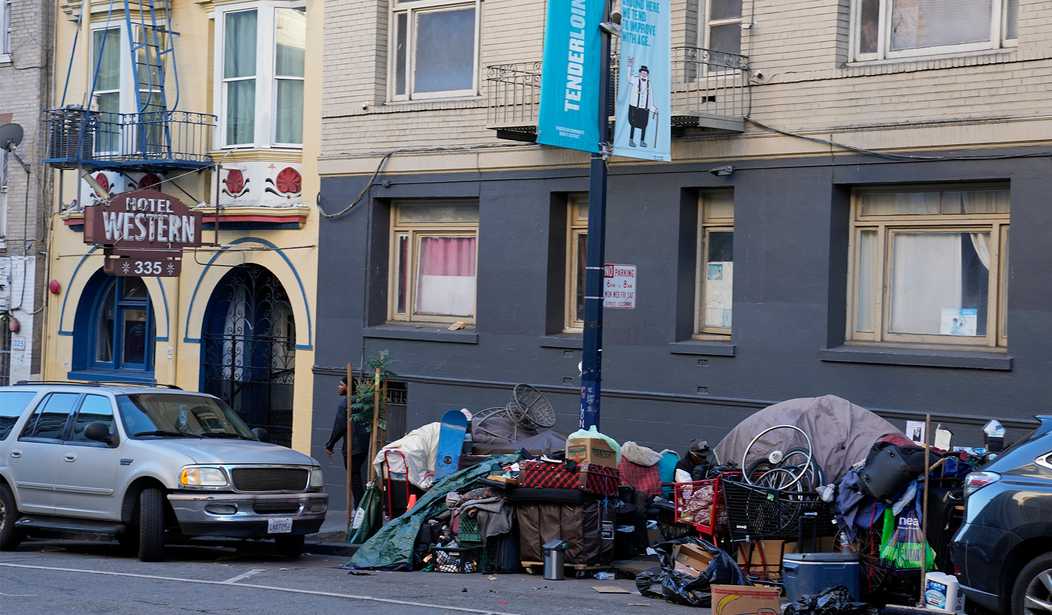There have been barrels of real and virtual ink spilled over the problem of homelessness. It's a problem in pretty much every major American city and many smaller cities and towns. Even Anchorage, Alaska, with winter temperatures plunging into double-digits below zero, has this issue, and we might note that here in the Great Land, the encampments come with the added possibility of attracting grizzly bears.
Not just ink, but money has been thrown at this problem. Millions, likely billions of dollars. The problem hasn't gotten any better. Every city still has its trash-strewn encampments; many street corners are still occupied by aggressive panhandlers, and some cities (I'm looking at you, San Francisco) have literally surrendered their sidewalks and streets to people dropping deuces, requiring the city to issue "poop maps" to residents and visitors.
From X (naturally), a poster called "Francesco" (@frandalorian) came up with an interesting idea: What about voluntary indentured servitude as a way out of homelessness? I'm not convinced, but let's take a look at his proposal.
Homelessness is a massive social problem—rampant drug use, crime, and enormous taxpayer costs. But what if there was a market-based solution that benefited everyone involved?
— Francesco™️ (@frandalorian) February 12, 2025
A thread on voluntary indentured servitude as a way out of poverty. 🧵👇🏻 pic.twitter.com/lxwFM2Qo68
Right there in the opening, he hits on two of the major stumbling blocks: Rampant drug use and crime. But he attempts to address those:
Instead of relying on welfare handouts, what if homeless individuals could sell their labor in advance through fixed-term contracts?
— Francesco™️ (@frandalorian) February 12, 2025
•Guaranteed shelter & food
•Work experience & stability
•Escrowed wages for long-term security pic.twitter.com/uxWb8e7OBf
It's a very libertarian solution. Many of our ancestors - including one of mine, a Donald MacKay, who came to the New World from Scotland in the last 1600s - sold themselves into indentured servitude for some time, normally seven years, to get passage to America. This has died out as a practice in the Western world and would require a revision of the legal strictures around contract labor to bring back, and candidly that's not going to happen. But - from a liberty standpoint - if a capable, consenting, competent adult freely chose this step, why shouldn't we allow it?
The idea: A legally binding contract where an individual voluntarily commits to work for a fixed period (e.g., 3-5 years).
— Francesco™️ (@frandalorian) February 12, 2025
In return, they receive:
•Stable housing
•A structured job
•A savings plan pic.twitter.com/br9VrYyr2b
It sounds like a decent, humanitarian idea. Here's where it would almost certainly go badly wrong:
Critics will scream “modern slavery”, but is living under a bridge, addicted to fentanyl, any freer?
— Francesco™️ (@frandalorian) February 12, 2025
This is a path to self-sufficiency, not dependency. A real solution, not feel-good slogans. pic.twitter.com/vwHMnEFbjq
Forget what the critics will scream, even though, yes, scream they would. It's the addiction angle that's troubling - and addiction is rampant among our homeless population.
See Related: So Much for Compassion: Homelessness Skyrocketed Under Biden, Democrats
'Wrong Neighborhood, Buddy!' Video Shows Fed-Up LA Residents Detaining Arsonist
There are pros and cons to this, like anything.
The pros: A humane solution for homelessness, without costing the taxpayers a lot of money, without the necessity of government intervention. A low-cost labor force for employers that need low-skilled labor - or for individuals who would benefit from some live-in help.
But the cons! Oh, the cons!
This is something I have seen, more or less, happen in real life. A dear friend of ours, a sweet, grandmotherly lady who was unfortunately rather naive, knew a much younger woman with two small children. The younger woman was evicted from her rented house, due to what she claimed was "bad luck" but was in fact a series of bad employment and financial decisions. In a fit of compassion, the older women took the younger in. Things went all right for a while, although the older woman's grocery bill kept ticking upward, and the younger women seemed less and less inclined to seek any employment. Then, one night, the younger woman cleaned out the older woman's purse, her silver flatware, and her jewelry, and disappeared into the darkness with her kids.
And that's the major con in this scheme - precisely this kind of thing. A huge proportion of the nation's homeless population is in this position because of addiction and mental health issues. In the former, the recidivism rate is horrendous; in the latter, what is needed is not employment, but treatment, and institutionalization if necessary. Any well-meaning, kind-hearted person who took in a homeless person under a scheme like this is setting themselves up for heartbreak, very likely loss due to theft, and quite possibly physical harm.
I'm an adamant minarchist. I think that government governs best that governs least; I favor (strongly) returning our national government to within its constitutional guidelines, and I am strongly in favor of the citizens having the maximum amount of personal autonomy - basically that we, as free citizens, may do as we like, with the only limit being acts that cause financial or physical harm to another. But this proposal - this is a bridge too far. This is an invitation to a bad ending. We need better solutions to the homelessness problem - but this is not it.














